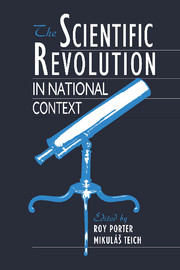Book contents
- Frontmatter
- Contents
- Notes on contributors
- Acknowledgements
- Introduction
- 1 Scientific Revolution, social bricolage, and etiquette
- 2 The Scientific Revolution in France
- 3 The Scientific Revolution in the German Nations
- 4 The new philosophy in the Low Countries
- 5 The Scientific Revolution in Poland
- 6 The Scientific Revolution in Spain and Portugal
- 7 The Scientific Revolution in England
- 8 The Scientific Revolution in Bohemia
- 9 Instituting science in Sweden
- 10 The Scientific Revolution in Scotland
- Index
4 - The new philosophy in the Low Countries
Published online by Cambridge University Press: 05 June 2012
- Frontmatter
- Contents
- Notes on contributors
- Acknowledgements
- Introduction
- 1 Scientific Revolution, social bricolage, and etiquette
- 2 The Scientific Revolution in France
- 3 The Scientific Revolution in the German Nations
- 4 The new philosophy in the Low Countries
- 5 The Scientific Revolution in Poland
- 6 The Scientific Revolution in Spain and Portugal
- 7 The Scientific Revolution in England
- 8 The Scientific Revolution in Bohemia
- 9 Instituting science in Sweden
- 10 The Scientific Revolution in Scotland
- Index
Summary
from Gemma Frisius and Simon Stevin to Christiaan Huygens, from Clusius to Hermannus, from Paludanus to Ruysch, from Paauw to De Graaf, from Van Helmont to Sylvius, from Beeckman to Swammerdam and Van Leeuwenhoek, and from Vesalius to Boerhaave, Dutch and Flemish scholars combined excellent educations with investigative enterprise, technical competence, and moral commitment. These and other people of the region achieved wide notice and enduring fame. In the low countries, the intellectual and cultural changes of the late middle ages and Renaissance had not just a broad influence, but a deep one as well. It was a place where local traditions and a patchwork of competing jurisdictions allowed both Humanism and the Enlightenment to prosper in difficult times. It was also a region in which the new science flourished.
Yet when we begin to examine the work of the many scholars of the region who helped to create fundamental changes in the European knowledge of nature, we will be forced to note an important fact: the new science grew mainly by the efforts of people engaged in working out the details of natural history, medicine, chemistry and mathematics. Perhaps the focus of attention people have given to ‘philosophers’ the likes of Galileo, Descartes, Newton and Leibniz has warped our expectations. To be sure, the Dutch Republic can claim Christiaan Huygens, and perhaps even Descartes, since the latter wrote his most important works in the United Provinces.
- Type
- Chapter
- Information
- The Scientific Revolution in National Context , pp. 115 - 149Publisher: Cambridge University PressPrint publication year: 1992
- 10
- Cited by



